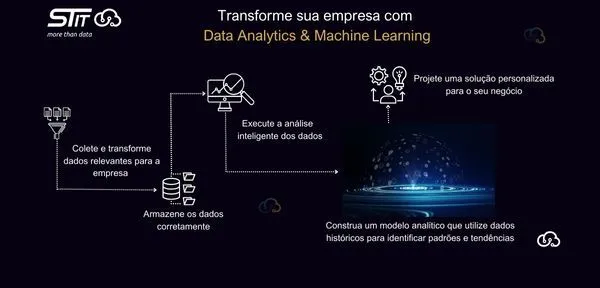FStrategic Flexibility and Smart Data The Pillars for an Efficient and Sustainable Digital Transformation
Digital Transformation is a journey that many companies are following these days and also a way to improve efficiency, increase productivity and remain competitive in an increasingly demanding market. But Digital Transformation is not just a matter of technology. It's a change in mindset and the way companies operate.
It is a trend that cannot be ignored by companies that wish to survive in an increasingly competitive and technological market. However, to achieve a true and effective Digital Transformation, it is necessary to go beyond the simple adoption of advanced technologies. You need Strategic Flexibility and Smart Data.
A Strategic Flexibility is the ability to adapt quickly to changes in the market and customer demands. It's an essential skill for companies that want to stay relevant and competitive in an increasingly dynamic world. To achieve Strategic Flexibility, companies must be willing to experiment with new approaches, take calculated risks, and be open to innovation.
You Smart Data are another key piece for true digital transformation. Data is the basis for making informed and accurate strategic decisions. With Smart Data, companies can identify market trends, better understand customer needs and optimize their business processes. To have Smart Data, companies must invest in advanced data analysis technologies and ensure that their employees have the necessary skills to work with these technologies.
True Digital Transformation requires a combination of Strategic Flexibility and Intelligent Data. Companies that want to achieve Digital Transformation must be prepared to adopt an agile and innovative mindset, experiment with new approaches and invest in advanced data analytics technologies. In addition, they must be willing to change their organizational culture and business processes to adapt to technological changes.
Why Digital Transformation Requires Strategic Flexibility and Smart Data?
Digital Transformation is a complex process that involves changes in all aspects of the business, from technological infrastructure to corporate culture. To be successful in this process, you need to have a flexible and adaptable approach that allows the company to adjust quickly to changes in the market. In addition, it is essential to have Smart Data that can be used to make more informed, evidence-driven decisions.
Find out below about successful cases of companies that have achieved extraordinary results through the adoption of Strategic Flexibility and Intelligent Data, and find out how these approaches can transform your business.
• Amazon: Amazon is one of the largest e-commerce companies in the world and has been a leader in innovation and Digital Transformation. The company uses Intelligent Data to understand its customers' purchasing behavior and customize its product offering. In addition, Amazon is known for its Strategic Flexibility, constantly testing new business models, such as drone delivery and the opening of physical stores, to adapt to market changes.
• Netflix: Netflix is a company that has revolutionized the entertainment industry with its streaming platform. To maintain its leadership position, the company invests heavily in intelligent data to understand its users' preferences and personalize its content offering. In addition, Netflix is known for its Strategic Flexibility, constantly launching new series and original films, adapting to market trends and changes in its users' consumption habits.
• Coke: Coca-Cola is a company that has a long history of success, but it is also adapting to market changes and investing in Digital Transformation. The company uses Intelligent Data to understand the behavior of its consumers and customize its product offering, launching new flavors and packaging to meet market demands. In addition, Coca-Cola has a Strategic Flexibility that allows it to adapt quickly to changes in the market, launching innovative marketing campaigns and investing in new technologies to improve the customer experience.
•Tesla: Tesla uses Smart Data to continually improve its electric cars and stay ahead of the competition. Every Tesla car has a large number of sensors that collect information about the vehicle's performance, such as speed, acceleration, braking and steering wheel position. Using this data to improve the performance and reliability of cars, as well as better understand customer needs.
In short, Tesla is a company that uses Smart Data extensively to continually improve its electric cars and stay ahead of the competition. Data collection and analysis is a key part of Tesla's business strategy, allowing the company to innovate quickly and deliver an exceptional experience to its customers.
So the question “Is your company ready?” it is essential for companies to assess their readiness for true Digital Transformation. Companies that want to stand out in an increasingly competitive and technological market must be willing to invest in Strategic Flexibility and Intelligent Data, in addition to being willing to change their organizational culture and business processes. Digital Transformation is an ongoing and challenging journey, but companies that dedicate themselves to it reap the benefits of increased efficiency, better customer experience and increased profitability.
In addition to investing in Strategic Flexibility and Intelligent Data, there are other practices that can help companies achieve true Digital Transformation.
One is the adoption of an agile and innovative mindset. Companies that want to adapt quickly to market changes must be willing to experiment with new approaches and take calculated risks. This means that companies must be willing to fail, learn from their mistakes and adjust their approach.
To lead the Digital Transformation, you need to be up to date on the main technological trends and know how to apply them strategically in business. It is also important to have a clear vision of the impact that Digital Transformation can have on the company and society as a whole.
So what is your strategy for Digital Transformation? Here are some tips to help you get started:
1. Identify Your Business Needs
Digital Transformation should not be an isolated technology initiative. Before choosing which technologies to use, it's important to understand your business needs and how technology can help you achieve your goals. Do a SWOT analysis to identify your business strengths, weaknesses, opportunities and threats. Use this information to develop a Digital Transformation strategy that is driven by your business needs.
2. Set Realistic Goals
When setting goals for Digital Transformation, it is important to be realistic and specific. Instead of saying “we want to increase our online presence”, be specific and say “we want to increase our organic traffic in 20% in the next 6 months”. This will make it easier to measure the success of your strategy.
3. Invest in Technology
Technology is a key component of Digital Transformation. Make sure you invest in the right tools for your business. This can include project management software, marketing automation tools, cloud storage solutions, and more. Make sure the tools you choose integrate well and work together.
4. Empower Your Employees
Digital Transformation isn't just about technology, it's about people. It is important that your employees are well-informed and empowered to deal with the changes that are taking place. Provide training to help them adapt to new technologies and work processes. Make sure everyone is aligned with your goals and working together to achieve them.
5. Monitor and Evaluate
Digital Transformation is an ongoing process. It is important to regularly monitor and evaluate the progress of your strategy. Measure success with specific metrics and make adjustments where necessary. Make sure your Digital Transformation strategy continues to evolve to meet the ever-changing needs of your business.
Another important practice is interdepartmental collaboration. Digital Transformation is not the responsibility of a single department or team. It's a journey that involves the entire company. Companies should encourage collaboration across departments and teams, encouraging the exchange of information and ideas.
Another important point is the integration between the areas of the company. Digital Transformation involves the integration of processes, systems and teams, aiming at optimizing communication and sharing information more efficiently. Therefore, it is important that the company promotes a collaborative culture to break down barriers between areas.
Digital Transformation is not the responsibility of a single department or team. It's a journey that involves the entire company.
Data security is also a key aspect of Digital Transformation. With the increasing adoption of technologies and the movement of information over the internet, data security has become a critical issue. It is important to invest in robust security systems and ensure that confidential customer and company information is always protected from cyber threats. Companies that handle large volumes of data, such as personal customer information, purchase histories, passwords and financial information, need to be especially vigilant about data security.
Data leaks can cause irreparable damage to a company's reputation and result in significant fines for privacy violations. In addition, with the entry into force of regulations such as GDPR in Europe and LGPD in Brazil, companies need to adapt to new data protection standards to avoid penalties.
That's why it's essential for companies to invest in robust data security systems such as firewalls, encryption, and two-factor authentication. Additionally, it is important to train employees to recognize potential cyber threats such as phishing and malware and take steps to reduce the risk of attacks. Data security is a crucial aspect of Digital Transformation and must be taken seriously to ensure business success in today's market.
Company culture also plays an important role in Digital Transformation. It is necessary to create an environment that encourages innovation, experimentation and continuous learning. This involves adopting an open mindset, breaking down rigid hierarchies, and promoting clear and transparent communication.
A culture that values diversity and inclusion can also drive Digital Transformation. Companies that embrace diversity of thought, experience and perspective can be more innovative and creative in their solutions.
Digital Transformation is a continuous process that involves a combination of Strategic Flexibility, Intelligent Data, Agile and Innovative Mindset, Interdepartmental Collaboration and Corporate Culture. Companies that adopt these practices will be better prepared to face the challenges of the current market and create a more sustainable and competitive future.
Another important aspect of Digital Transformation is the migration to the cloud, which allows companies to store and access their data and applications more securely and efficiently. The cloud offers a scalable, flexible, and secure infrastructure that can help companies reduce costs, increase efficiency, and improve collaboration.
A fundamental practice, as it allows companies to access their data and applications from anywhere, at any time. ST IT Cloud has expertise in several cloud platforms, including AWS, Azure and Google Cloud Platform, and can help your company choose the best option for your specific needs. In addition, ST IT Cloud has a strong commitment to data security and offers cloud security solutions to protect your company's confidential information.
ST IT Cloud can migrate your company's data and applications to the cloud quickly, securely and efficiently, offering everything from consulting and planning to implementation and cloud management.
Enjoy the benefits of the cloud quickly, securely and without complications. With a highly qualified and experienced team, ST IT Cloud can help in your company's Digital Transformation journey and direct you with the best Cloud or Analytics solution according to your needs and business objectives.







